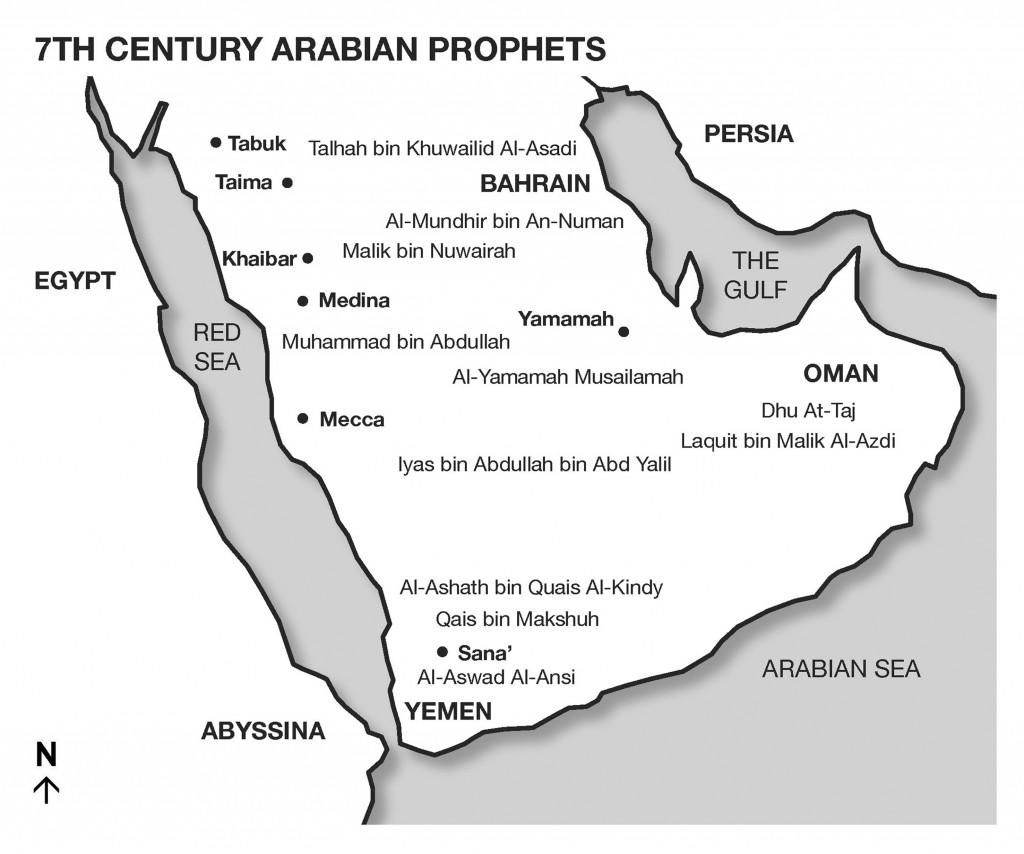It is orthodox Muslim belief that Muhammad is the final prophet – but it took many years for this belief to become orthodox as there were other people claiming to prophets around this time. It was through the actions of Muhammad’s close companions that the belief that he was the final prophet was enforced and made orthodox.
Muhammad in Context
The following people claimed to be prophets at the same time Muhammad was claiming to be a prophet:
- Talhah bin Khuwailid Al-Asadi
- Malik bin Nuwairah
- Al-Mundhir bin An-Numan
- Al-Yamamah Musailamah
- Dhu At-Taj
- Muhammad bin Abdullah
- Laqit bin Malik Al-Azdi
- Iyas bin Abdullah bin Abd Yalil
- Al-Ashath bin Qais Al-Kindy
- Qais bin Makshuh
- Al-Aswad Al-Ansi (Dr. Shawqi Abu Khalil, Atlas on the Prophet’s Biography, Riyadh: Darussalam, 2003, p. 254)
These prophets were monotheists and some were known to have their own words from God which they taught to their followers. This is the Arabian context in which Muhammad was doing his activity; he was not alone.
When some of the Arabian tribes accepted Islam they accepted Muhammad as a prophet along with their own prophet. They had at least two prophets. Muhammad was certainly not viewed as the final prophet by these early Muslims.
How did the belief that Muhammad was the final prophet become the orthodox view?
(Immediately after the death of Muhammad) The situation that Abu Bakr faced on assuming the caliphate was very grim. Many tribes apostatised from Islam and refused to pay Zakat. Many false prophets rose throughout the length and breadth of Arabia, and many people offered allegiance to them. The argument that weighed with them was that a living prophet was to be preferred to one who was dead. (Prof. Masud ul Hasan, History of Islam, 2002, vol. 1, p. 97)
And so we see that after Muhammad’s death these other prophets continued their activity. Abu Bakr’s response to this situation was to declare war on these Muslims and unify them around Muhammad alone. To the north of Medina was the tribe of Asad. They followed their prophet Talhah. Muhammad’s followers marched against them and defeated them at Buzakha. The tribe of Hanifa was led by the prophet Musailamah. Muhammad’s followers fought hard against this tribe and finally killed Musailamah. In Oman Laquit b Malik was the prophet. An army was sent against him. Laquit and ten thousand of his followers were killed. In Yemen there was a prophet called Aswad Ansi. He had a large following. Muhammad’s army defeated them and killed Aswad.
This is how Muhammad became the final prophet; his close companions killed all the other prophets and forced their version of Islam upon these Arab tribes. Muhammad’s Qur’an was to be preserved but any Qur’an-like material from these other prophets was not preserved.
Reflections and Applications
1. It was not universally acknowledged among the early Muslims that Muhammad was the final prophet. This belief took time to be established and was enforced violently on the early Islamic community. If these different early Islamic communities had been allowed to continue to follow their own prophet then their belief that Muhammad was not the final prophet would continue today and Islam would look very different.
2. Muhammad and his companions did not introduce monotheism into Arabia but by killing the other prophets they introduced Muhammadism. The Islam of these early Muslim communities who had other prophets along with Muhammad now had to conform to Muhammadism.
3. The killing of these prophets and stopping the transmission of any Qur’an-like material they may have had destroyed important evidence for the context of Muhammad’s Qur’an. How did what Muhammad recite relate to what these other prophets recited? Was there common material between them? Did any of their material get included in Muhammad’s Qur’an or was Muhammad’s completely different to them? It is an assumption to say there was no connection between them and Muhammad. To claim that what Muhammad recited was completely unique is an argument from silence, a silence created by killing these prophets and their words. Therefore when we think about the history of the Qur’an we need to consider this context. Even if we cannot answer certain questions about these prophets and their words we can at least know that modern Islamic claims are just assumptions and arguments from silence.
4. “How Muhammad became the final prophet” would be a good title for a book and there is plenty of material in the Islamic sources to work with. I say this because there are a few books with titles like “How Jesus Became God” and Muslims seem to like these books. However, Muslims cannot say that because early Christians wrestled to understand the divinity of Jesus this means his divinity is a later invention. Would Muslims say the same about Muhammad being the final prophet? Some issues take a while to sort out. The main issue for Christians and Muslims in this area is to make sure we learn our history properly and not rely on cliches and exaggeration.


Sam, this is very interesting. I had no idea about this; I certainly agree – we need to understand history properly.
Great article!
Thank you
Another interesting article on your site, keep up good work!